“Immerse yourself in the grandeur of Victorian-era homes with their commanding presence, historic charm, and vibrant color palettes that redefine architectural beauty.”
Table of Contents
Toggle
- Royal Exhibition Building in Melbourne
- The Palace of Westminster in London, England
- The Painted Ladies (San Francisco, California, USA)
- Cliveden House in Taplow, England
- Beautifully Renovated Victorian House
- Sycamore Lodge
- Boldt Castle
- Heidelberg Castle (Heidelberg, Germany
- Winchester Mystery House (San Jose, California, USA)
- Biltmore Estate (Asheville, North Carolina, USA)
Royal Exhibition Building in Melbourne
The Royal Exhibition Building in Melbourne, Victoria, Australia, is a significant historical landmark with a rich heritage. Here are some key details about this iconic structure based on the search results:
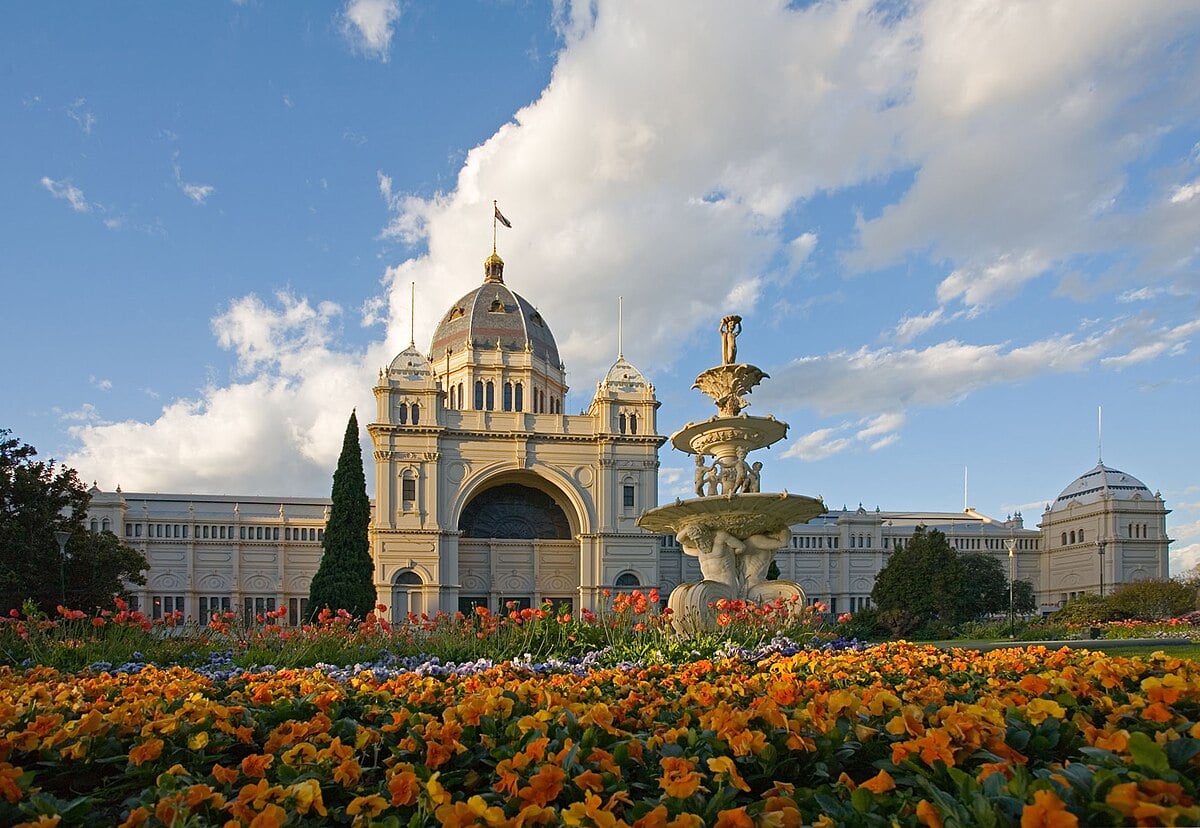
- History: Built in 1879-1880 as part of the international exhibition movement, the Royal Exhibition Building has hosted over 50 exhibitions globally between 1851 and 1915. It is recognized as the world’s most complete surviving site from this era.
- Architecture: Designed by architect Joseph Reed in an eclectic style inspired by Byzantine, Romanesque, Lombardic, and Italian Renaissance influences, the building features a distinctive dome modeled on the Florence Cathedral. It is composed of brick, timber, steel, and slate, showcasing intricate design elements typical of Victorian architecture.
- Current Use: The Royal Exhibition Building is no longer Melbourne’s largest commercial exhibition center, with that role now held by the Melbourne Convention & Exhibition Centre. However, it continues to serve as an exam hall for various educational institutions like the University of Melbourne and hosts a variety of exhibitions and events. The building is closely linked with activities at the adjacent Melbourne Museum.
- UNESCO World Heritage Status: Recognized by the UNESCO World Heritage Committee for its significance as a rare intact reminder of the 19th-century international exhibitions movement, the Royal Exhibition Building stands as a testament to Melbourne’s history and architectural heritage.
- Dome Promenade: Visitors can explore the Dome Promenade within the Royal Exhibition Building to enjoy panoramic views of Melbourne’s skyline and learn about the building’s history through guided tours. The restoration efforts aim to conserve the intricate paint and plasterwork under the dome, preserving this UNESCO World Heritage site for future generations.
The Palace of Westminster in London, England
The Palace of Westminster, located in London, England, is a historic landmark and the meeting place of the Parliament of the United Kingdom. Here are some key details about this iconic building based on the search results:
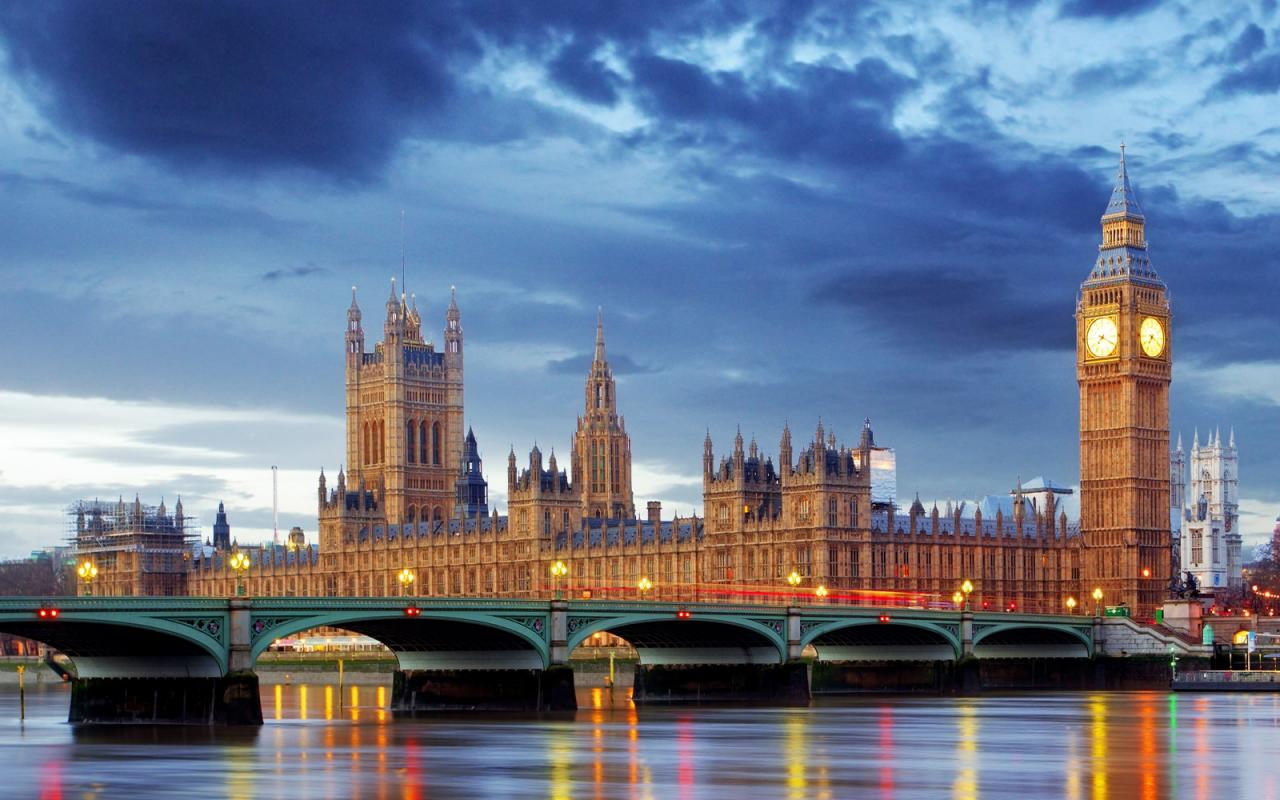
- History: The Palace of Westminster has a rich history dating back to the 11th century when it served as a royal palace. It became the principal residence of English monarchs until a fire in 1512. Subsequently, it continued to house the Parliament of England and various courts of law. The current building, designed in the Gothic Revival style by Charles Barry and Augustus Pugin, was constructed between 1840 and 1876 after a major fire in 1834.
- Architecture: The Palace of Westminster features intricate Gothic Revival architecture, with notable elements like the Elizabeth Tower housing Big Ben, the House of Lords chamber, and the House of Commons chamber. The building’s ornate design and historical significance make it a symbol of British democracy and governance.
- UNESCO World Heritage Site: Along with Westminster Abbey and St Margaret’s Church, the Palace of Westminster was designated a UNESCO World Heritage Site in 1987. This recognition highlights its outstanding universal value as a historic and architectural ensemble that symbolizes monarchy, religion, and power in British history.
- Cultural Significance: The Palace of Westminster is not only a political hub but also a major tourist attraction in London. Its iconic silhouette along the River Thames, including landmarks like Big Ben, draws visitors from around the world. Guided tours are available for UK residents to explore its state rooms, chambers, and historic halls.
The Painted Ladies (San Francisco, California, USA)
The Painted Ladies in San Francisco, California, are a set of iconic Victorian houses known for their colorful facades and historical significance. Here are some key insights gathered from the search results:

- Historical Significance: The term “Painted Ladies” was first used by authors Elizabeth Pomada and Michael Larsen in 1978 to describe these Victorian and Edwardian houses repainted in three or more colors, enhancing their architectural details. These vibrant homes symbolize San Francisco’s architectural traditions and have become a staple of the city’s landscape, representing artistic expression and creative impulse.
- Location: The most famous set of Painted Ladies is located across the street from Alamo Square Park along Steiner Street. This row of colorful Victorian homes, also known as “Postcard Row” or the “Seven Sisters,” offers a picturesque sight that has been featured in various movies and TV shows, including the opening credits of “Full House”.
- Symbolism: The Painted Ladies are symbolic of San Francisco’s rich history, with their bright colors reflecting the city’s architectural diversity and creativity. These homes have come to represent a unique blend of Victorian charm and modern vibrancy, attracting visitors from around the world to admire their beauty and capture their essence through photography.
- Tourist Attraction: The Painted Ladies are a must-see attraction in San Francisco, drawing visitors to marvel at their picturesque setting against the backdrop of the city skyline. Known for their scenic beauty, these Victorian homes stand as a reminder of old San Francisco while showcasing the city’s evolving urban landscape. The area around Alamo Square Park offers a perfect vantage point to appreciate these historic gems.
Cliveden House in Taplow, England
Cliveden House in Taplow, England, is a luxurious country house hotel with a rich history and elegant surroundings. Here are some key details about Cliveden House based on the search results:
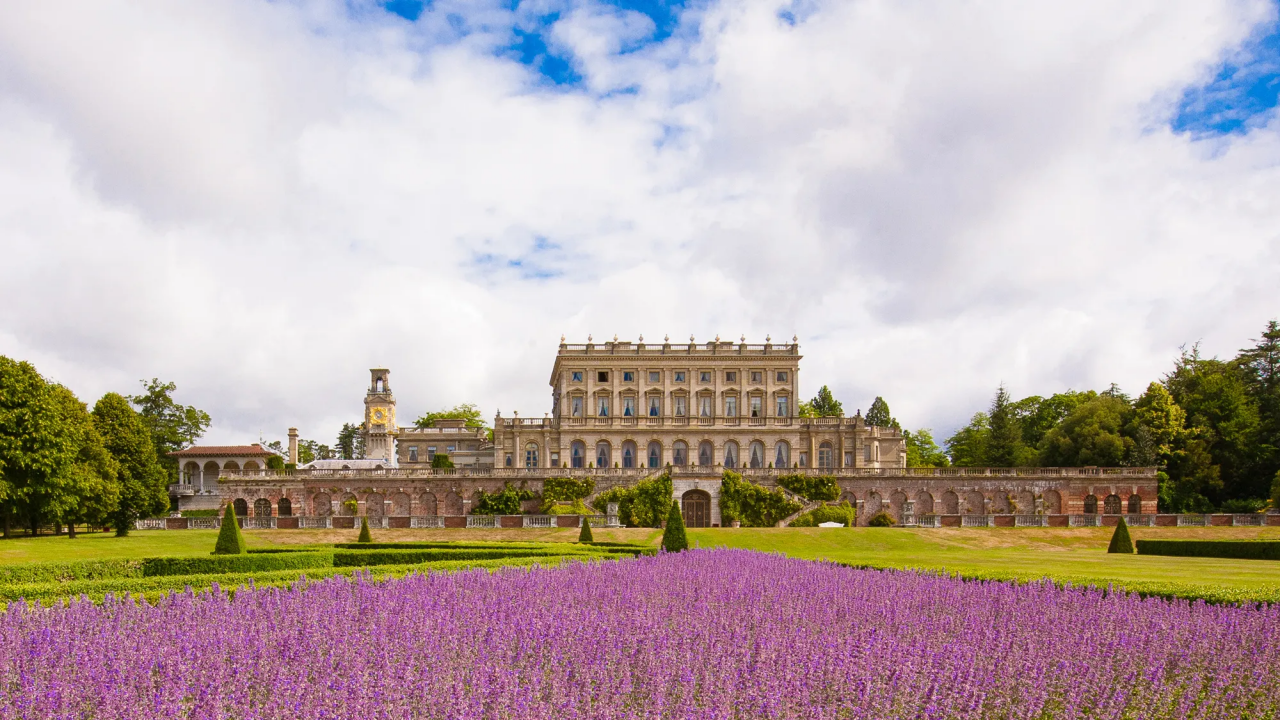
- History: Built in 1666 by the 2nd Duke of Buckingham as a gift to his mistress, Cliveden House has a history of over 350 years filled with powerful personalities, iconic parties, and scandalous affairs. The house has remained a symbol of intrigue and glamour, hosting elite celebrations and serving as an exclusive country house escape just an hour outside of London.
- Architecture: Cliveden House is a Grade I listed stately home set on 376 acres of National Trust grounds. The architecture reflects grandeur and sophistication, offering guests a luxurious five-star experience in a Relais & Châteaux hotel and spa. The house features beautifully presented gardens and woodlands that add to its charm and appeal.
- Accommodation: Cliveden House offers a variety of luxury rooms and suites for guests seeking unrivaled comfort in the English countryside. From individually named guestrooms to opulent suites, visitors can choose accommodations that suit their preferences. Additionally, Spring Cottage, a three-bedroom cottage perfect for families or couples seeking a romantic hideaway, provides another exclusive lodging option.
- Visitor Experience: Guests at Cliveden House can indulge in the full Cliveden experience, including access to the award-winning Cliveden Spa facilities. The hotel offers various amenities and activities, from spa treatments to luxury afternoon tea in The Dining Room, allowing visitors to create their own memorable moments within the historic setting of Cliveden House.
Beautifully Renovated Victorian House
The history of beautifully renovated Victorian houses is a tale of architectural grandeur, historical significance, and modern adaptations. Here are some key insights gathered from the search results:
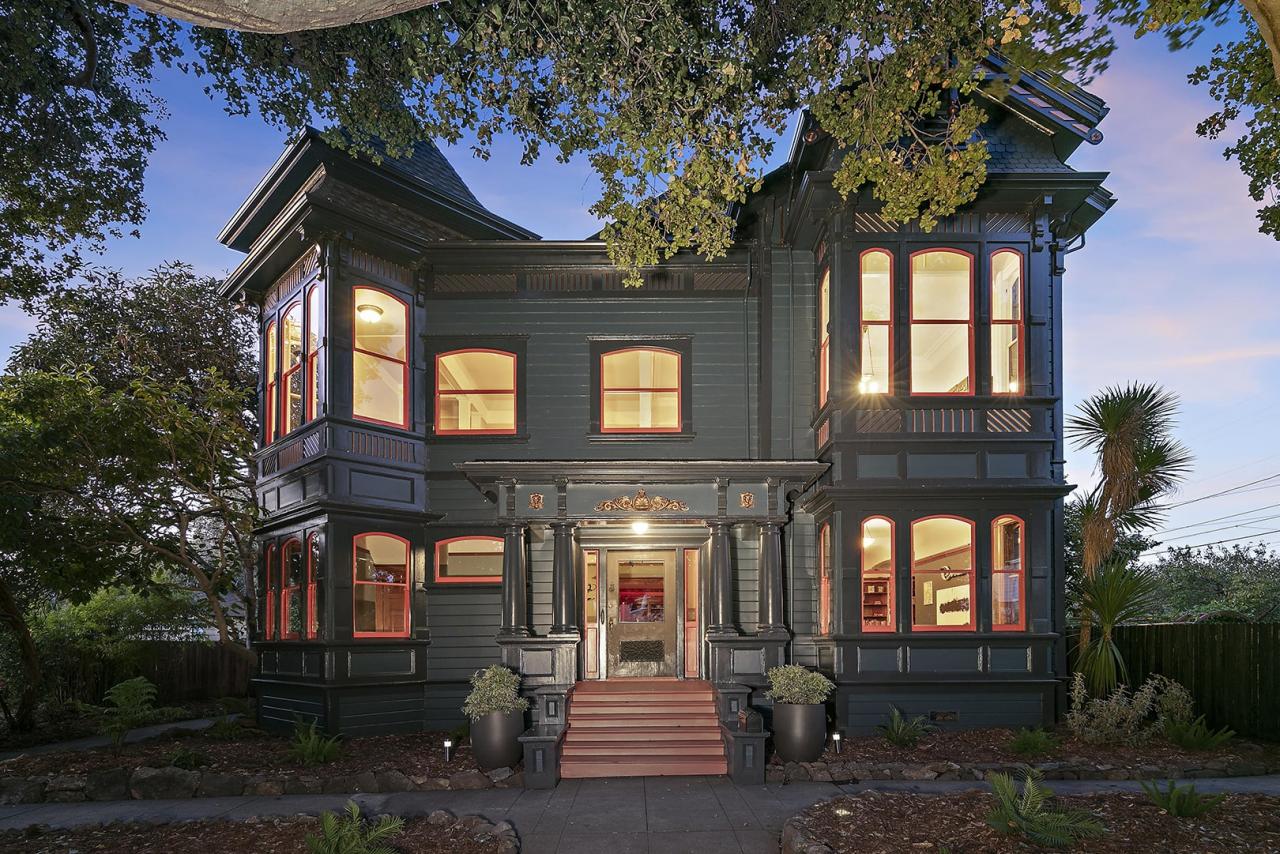
- Victorian Era: Victorian style homes emerged during the mid-to-late 1800s, coinciding with Queen Victoria’s reign in the U.K. The aesthetic flourished in the U.S. about 50 years later, influenced by factors like the expansion of railways and the Industrial Revolution. These homes offered a chance to own a piece of history, characterized by eclectic designs, colorful exteriors, high ceilings, intricate trim work, and opulent details like stained glass and decorative woodwork.
- Architectural Features: Victorian houses typically have two to three stories with steep gabled roofs, round towers, turrets, and dormers. Architects aimed to create complex roof lines that draw the eye upward. The era marked a departure from mere functional architecture to designs that expressed individual taste, social aspirations, and uniqueness. New chemical dyes revolutionized house colors, allowing for bold and bright hues that defined the Victorian era.
- Renovation and Preservation: Many Victorian houses have undergone renovations to adapt to modern living standards while preserving charming original elements like crown moldings and grand fireplaces. Homeowners often balance maintaining historic details with implementing necessary updates for contemporary comfort. Renovations may involve restoring character and charm while incorporating modern elements to enhance functionality and aesthetics.
- Global Presence: Victorian-style homes can be found not only in the U.K. but also in countries like the U.S., Canada, and Australia. While conservation efforts have preserved many Victorian homes in the U.K., some historic houses in the U.S. faced demolition during urban renewal initiatives starting in the 1950s. Despite challenges, millions of Victorian houses remain worldwide, each telling a unique story of bygone eras.
Sycamore Lodge
Sycamore Lodge is a luxury camping and RV resort located in North Carolina, offering a unique combination of amenities and rustic camping experiences. Here are some key details about Sycamore Lodge based on the search results:
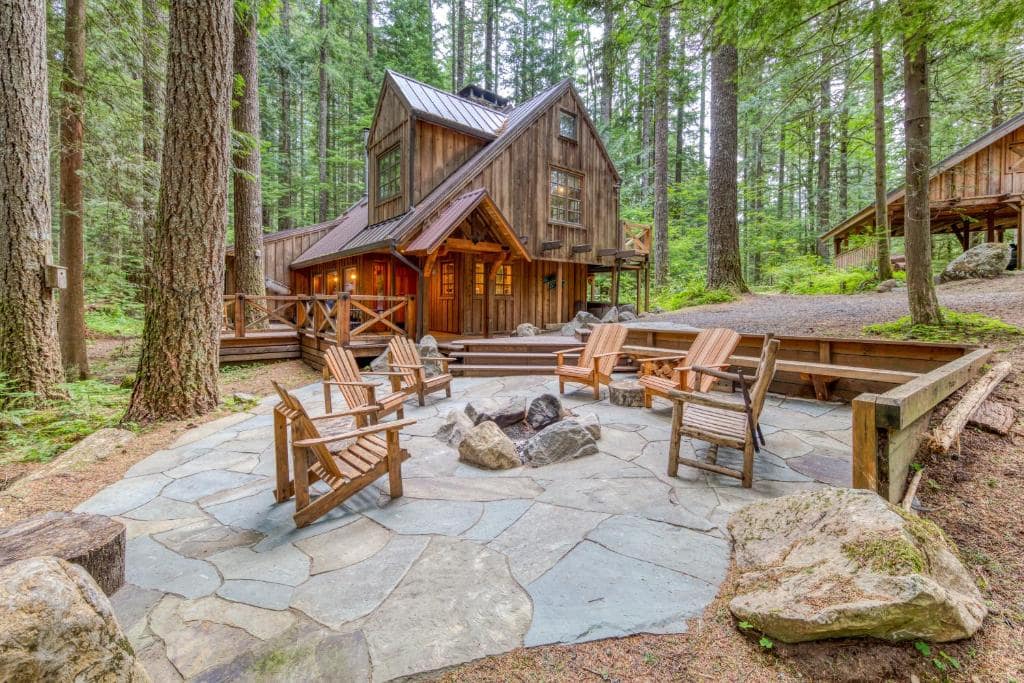
- Location: Situated just 70 miles south of Raleigh and 90 miles east of Charlotte, North Carolina, Sycamore Lodge Resort provides a convenient escape into nature for residents of these cities. The resort is close to various attractions, including the historic Pinehurst Golf Course, offering guests a diverse range of activities to enjoy during their stay.
- Amenities: Sycamore Lodge Resort boasts a range of amenities for guests to enjoy, such as a fully stocked kitchen, game room, library, fireplace, TV room, mini-golf course, playground, and a catch-and-release fishing pond. The resort’s 194-acre property features beautiful pine, sycamore, dogwood, oak, and magnolia trees that create a picturesque setting for camping and outdoor activities.
- Accommodations: The resort offers luxury camping and RV facilities for visitors looking to experience the beauty of North Carolina’s natural surroundings. Guests can rent golf carts to explore the expansive grounds in style and enjoy the comfort of modern amenities within the lodge and campground areas. The resort provides a welcoming environment where neighbors become friends and friends become family..
- Activities: Guests at Sycamore Lodge can engage in various activities during their stay, from exploring the lodge’s facilities to fishing in the stocked pond or playing mini-golf. The resort’s proximity to multiple golf courses offers golf enthusiasts ample opportunities to enjoy a round of golf at nearby clubs like Foxfire Golf Club, Seven Lakes, National Golf Club, and Pinehurst. Additionally, attractions like the North Carolina Zoo in Asheboro provide additional entertainment options for visitors looking to explore the area.
Boldt Castle
Boldt Castle, located in the Thousand Islands region of New York, USA, is a historic and picturesque attraction with a captivating story behind its construction. Here are key details about Boldt Castle based on the search results:
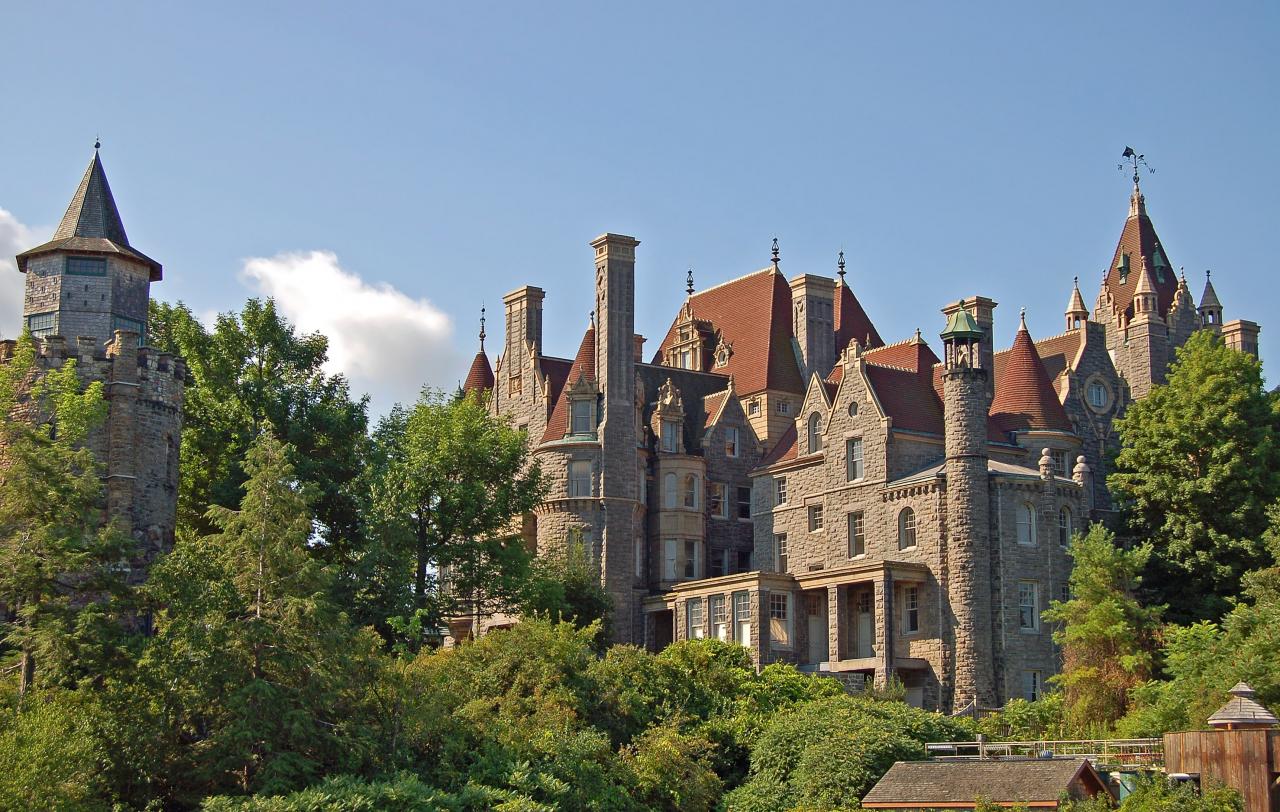
- Construction and Design: Built between 1900 and 1904 by millionaire hotel magnate George C. Boldt as a tribute to his beloved wife Louise, Boldt Castle was designed as their summer dream home. The castle, featuring a Châteauesque architectural style, was meant to rival European castles and stand as a symbol of their love and success. However, construction abruptly ceased in early 1904 following the sudden death of Louise, leaving the property vacant for over seventy years.
- Historical Significance: Boldt Castle is renowned for its tragic love story, reflecting the devotion of George Boldt to his wife and the dream that went unfulfilled due to her untimely passing. The castle stands as a poignant reminder of lost love and unfulfilled dreams, attracting thousands of tourists each year who come to explore its grandeur and learn about the Gilded Age lifestyle it represents.
- Restoration and Accessibility: Over the years, significant restoration and rehabilitation work has been undertaken on Boldt Castle and its surrounding structures. Today, most of the rooms on the first and second floors are restored and furnished, offering visitors a glimpse into the castle’s past. The Thousand Islands Bridge Authority operates and maintains Boldt Castle as a non-profit organization, allowing guests to explore the grounds by ferry or tour boat from various locations in New York and Ontario.
- Visitor Experience: Visitors to Boldt Castle can enjoy self-guided tours of the impressive buildings, learn about the tragic love story behind its construction, and wander through the beautiful gardens on the five-acre estate. The castle’s location on Heart Island in the Saint Lawrence River provides a scenic backdrop for exploring this architectural gem that stands as a testament to enduring love and historical significance.
Heidelberg Castle (Heidelberg, Germany
Heidelberg Castle, or Schloss Heidelberg, in Germany is a captivating historical site with a rich past and architectural significance. Here are key details about Heidelberg Castle based on the search results:
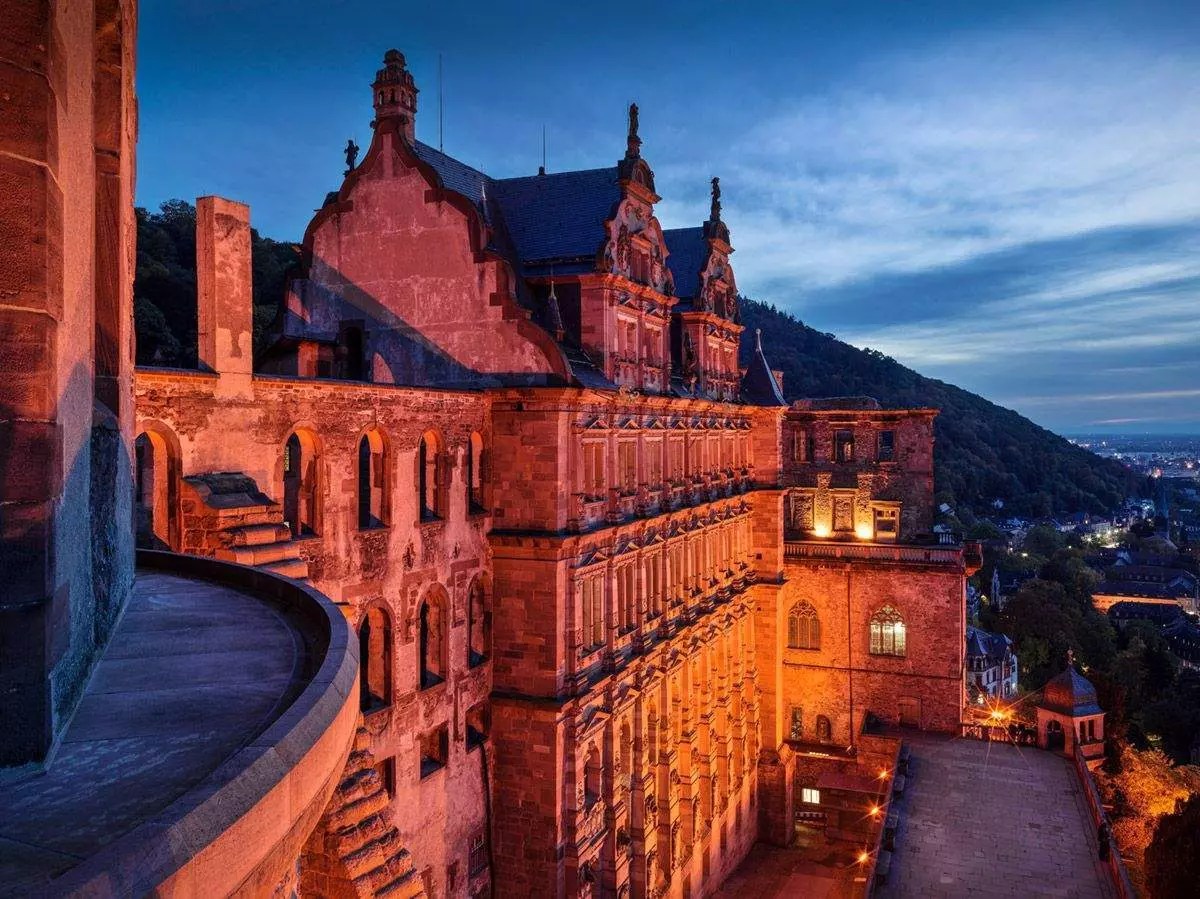
- Historical Background: Heidelberg Castle’s history dates back to the 13th century when it was first mentioned. The castle evolved over centuries, showcasing a blend of Gothic and Renaissance architectural elements. It served as a regal residence for Prince Electors and boasted an impressive ensemble of buildings, including the Gläserner Saalbau, Ottheinrichsbau, Friedrichsbau, and Englischer Bau. The castle’s silhouette dominates the old town center of Heidelberg, offering a striking view over the Neckar valley.
- Architecture and Features: Heidelberg Castle is a combination of several buildings surrounding an inner courtyard, each highlighting different periods of German architecture. The castle’s ruins stand majestically on a hill above Heidelberg, providing visitors with breathtaking views of the city and the Neckar River. The castle’s architectural masterpieces create a resplendent frame for the courtyard, reflecting the grandeur of its past as a regal residence.
- Visitor Experience: Each year, Heidelberg Palace attracts around a million visitors from around the world who come to explore its impressive ruins synonymous with Romanticism since the early 19th century. Visitors can tour the magnificently furnished rooms, learn about the castle’s history, and enjoy panoramic views over Heidelberg from the Great Terrace or gardens. The castle also offers opportunities for private functions, weddings, and guided tours to delve deeper into its historical and cultural significance.
- Access and Activities: Visitors can reach Heidelberg Castle by car, bike, funicular, or on foot. Guided tours are available from Frankfurt for those looking to explore this iconic landmark. The castle grounds feature attractions like the Heidelberg Tun (World’s Largest Wine Barrel), Apothecary Museum (Deutsches Apotheken-Museum), and special events like the Schlossbeleuchtung (castle lighting) with fireworks displays commemorating historical events. The castle also offers dining options at Scharffs Schlossweinstube for those looking to savor local dishes in a historic setting.
Winchester Mystery House (San Jose, California, USA)
The Winchester Mystery House in San Jose, California, is a fascinating and enigmatic mansion with a history shrouded in mystery and intrigue. Here are some key details about the Winchester Mystery House based on the search results:
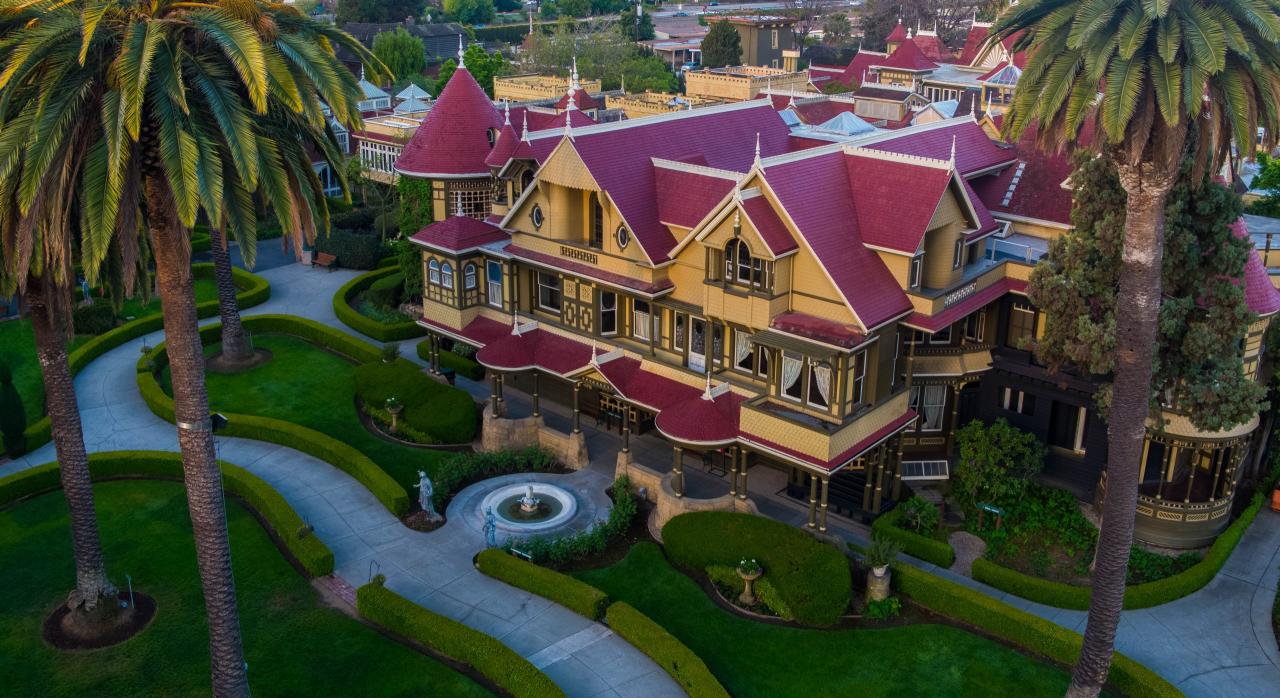
- History and Construction: The Winchester Mystery House was built by Sarah Winchester, heiress of the Winchester Repeating Arms fortune, over a period of 38 years from 1884 until her death in 1922. Sarah Winchester embarked on continuous renovations, resulting in a sprawling Victorian-style mansion with peculiar features like doors opening to walls, staircases leading to ceilings, secret passages, and rooms with no apparent purpose. The house boasts over 160 rooms, including 40 bedrooms, 10,000 windows, and two basements, showcasing Sarah’s eccentric architectural vision.
- Legend and Haunting: The mansion’s construction is steeped in legend and speculation. Some believe that Sarah Winchester was haunted by the spirits of those killed by the Winchester rifle and that she built the house to appease these tormented souls. The house’s design includes intricate details like doors leading to drops, staircases to nowhere, and secret passages, adding to its mysterious allure. Despite claims of ghostly encounters and paranormal phenomena on the property, the truth behind Sarah Winchester’s motivations remains a subject of fascination and debate.
- Visitor Experience: The Winchester Mystery House has been open to the public since 1923, offering guided tours that allow guests to explore the enigmatic estate and unlock its secrets. Tour options include guided mansion tours, Walk with Spirits tours, garden tours, Flashlight Tours around Halloween and on Friday the 13th, as well as special events like Axe Throwing and the seasonal Halloween experience called Unhinged. Visitors can delve into the mansion’s history, architectural oddities, and Sarah Winchester’s intriguing life story while experiencing a unique blend of mystery and history.
- Cultural Impact: The Winchester Mystery House has left a lasting impact on popular culture. It has been featured in various media, including movies like “Winchester” in 2018 starring Helen Mirren. Additionally, the mansion has inspired novels, music album covers, and even served as a setting for fantasy novels and podcasts. Its unique architecture and haunting reputation have captured the imagination of artists and storytellers alike.
Biltmore Estate (Asheville, North Carolina, USA)
The Biltmore Estate in Asheville, North Carolina, USA, is a historic house museum and tourist attraction known for its grandeur and architectural beauty. Here are key details about the Biltmore Estate based on the search results:
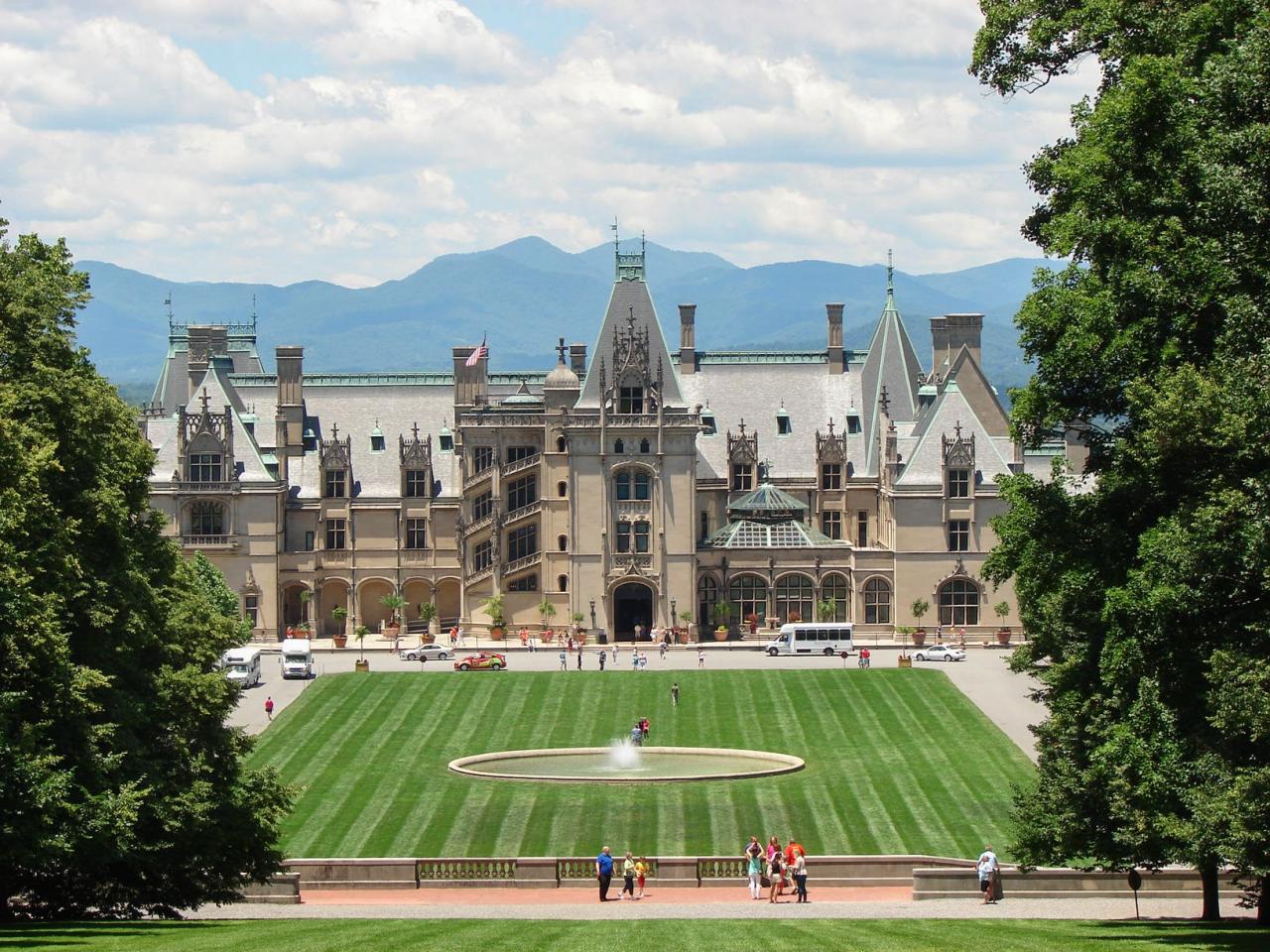
- History: Built by George Vanderbilt between 1889 and 1895, the Biltmore Estate is America’s largest home, spanning 8,000 acres in the Blue Ridge Mountains of Asheville. The estate features the Biltmore House, a magnificent French Renaissance château-style mansion with 250 rooms, designed by architect Richard Morris Hunt. The estate also includes beautiful gardens, a winery, and various recreational activities for visitors to enjoy.
- Visitor Experience: The Biltmore Estate offers visitors a chance to explore the opulent interiors of the Biltmore House, stroll through the meticulously landscaped gardens designed by Frederick Law Olmsted, and sample wines at the estate’s winery. Guests can partake in guided tours of the house, enjoy outdoor activities like hiking and biking on the estate grounds, and experience seasonal events and exhibitions that showcase the estate’s rich history and cultural significance.
- Cultural Significance: The Biltmore Estate stands as a symbol of Gilded Age extravagance and architectural excellence in America. It serves as a testament to George Vanderbilt’s vision of creating a self-sustaining estate that combined beauty, innovation, and hospitality. The estate’s preservation efforts and commitment to sustainability have earned it recognition as a National Historic Landmark and a popular destination for tourists seeking to immerse themselves in history and luxury.
- Legacy: The Biltmore Estate continues to be a premier destination for travelers seeking a blend of history, culture, and natural beauty. Its legacy as a marvel of architecture and design showcases the grandeur of America’s past while offering modern amenities and experiences that cater to contemporary tastes. The estate remains an iconic landmark in Asheville, inviting guests to step back in time and indulge in the splendor of this historic treasure.



